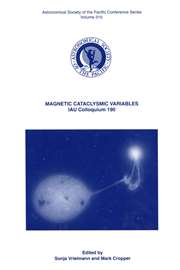No CrossRef data available.
Article contents
Variations of the Period of AH Virginis
Published online by Cambridge University Press: 12 April 2016
Extract
AH Virginis was discovered by GUTHNICK and PRAGER (1929) and since that time the system was observed photographically, visually and, more recently, photoelectrically. The variable belongs to the class of eclipsing binaries of the W UMa type. It has a period of 0.41 days and spectrographic as well as photometric elements have been derived by CHANG (1948) and BINNENDIJK (1960), respectively. The most interesting result of discussions by KWEE (1958), BINNENDIJK (1960), HERCZEG (1962), and PURGATHOFER and PROCHAZKA (1967) is the fact that the residuals between the observed and the computed epochs of minima cannot be represented by a linear relation and show the tendency of producing sudden variations in the period of the system.
- Type
- IV. Duplicity and its Consequences among the Intrinsic Variable Stars
- Information
- Copyright
- Copyright © Cambridge University Press 1971


